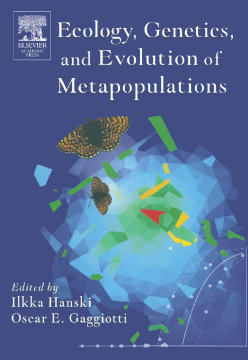
Additional Information
Book Details
Abstract
Ecology, Genetics and Evolution of Metapopulations is acollection of specially commissioned articles that looks at fragmented habitats, bringing together recent theoretical advances and empirical studies applying the metapopulation approach. Several chapters closely integrate ecology with genetics and evolutionary biology, and others illustrate how metapopulation concepts and models can be applied to answer questions about conservation, epidemiology, and speciation.
The extensive coverage of theory from highly regarded scientists and the many substantive applications in this one-of-a-kind work make it invaluable to graduate students and researchers in a wide range of disciplines.
- Provides a comprehensive and authoritative account of all aspects of metapopulation biology, integrating ecology, genetics, and evolution
- Developed by recognized experts, including Hanski who won the Balzan Prize for Ecological Sciences
- Covers novel applications of the metapopulation approach to conservation
"Conservation biologists and ecologists in their quest for how best to preserve biodiversity in landscapes that are being rapidly fragmented may find intriguing avenues of thought in this newly edited volume of Ecology, Genetics, and Evolution of Metapopulations. "
-Jennifer H. Mattei, Department of Biology, Sacred Heart University, in JOURNAL OF THE TORREY BOTANICAL SOCIETY, 2004
"Excellent readings for anyone interested in current issues in population and community ecology, and a wonderful cource sourcebook. Highly recommended."
-Simon Levin, Princeton University
"There is no better source of practical applications of the metapopulation framework than this book.
-Peter Kareiva, Lead Scientist, The Nature Conservancy & Adjunct Professor, UCSB
"Th[is] result is the most comprehensive treatment of metapopulations yet undertaken, and it will remain so for quite some time."
-Peter Grant, Princeton University
